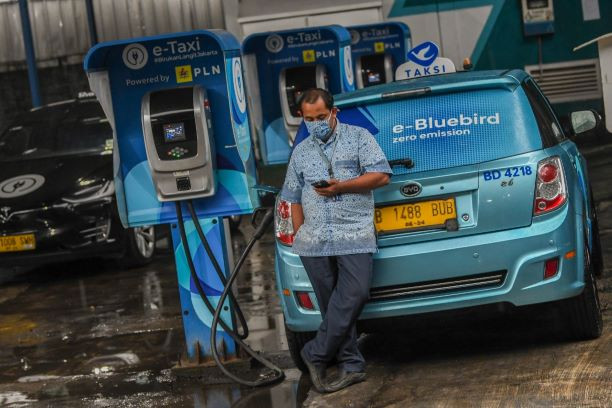Electric vehicles, now!
The hefty price hikes at Pertamina gas stations earlier this month not only alleviate the massive strain subsidies are putting on state coffers but also make conventional cars much more expensive to use.
Change Size

T
he stars seem to have aligned for the next step on Indonesia’s way to becoming an electric vehicle (EV) powerhouse as higher gasoline prices coincide with excess supply of electricity in the Java-Bali grid.
The hefty price hikes at Pertamina gas stations earlier this month not only alleviate the massive strain subsidies are putting on state coffers, but also make conventional cars much more expensive to use. The daily running costs of EVs are less than half those of combustion-engine vehicles, and increasing fuel prices will tilt the balance further in their favor.
During a business forum last month, Finance Minister Sri Mulyani Indrawati said Indonesians were getting more incentivized to use EVs as fuel oil prices were rising.
People are reassessing the cost of vehicle ownership, giving more weight to operating expenses versus purchasing price. Perhaps some will look to EVs not just as a luxury item to show off when handing the keys to the shopping-mall valet. Perhaps some will appreciate not having to worry so much about the cost of each extra kilometer on the road?
That is entirely up to the individual. For the nation as a whole, meanwhile, the logic goes something like this: Why compete with other countries scrambling to get their hands on scarce oil when Indonesia has abundant domestic-energy sources? Or, to be blunt, why import crude from a global market disrupted by sanctions while sitting on decades worth of coal?
Coal has a dreadful carbon footprint, as everyone knows, but if even Germany wants coal from Indonesia, how can anyone blame Indonesia for wanting coal from its own soil?
From a strategic point-of-view, it is rational for Indonesia to shift as much as possible from imported oil to homegrown power by using electricity for transportation -- and for cooking, and for anything else.
To be fair, however, last week’s presidential instruction mandating the use of EVs for government officials across the country is about more than that.
Developing downstream industries to get more value out of the country’s natural resources has been a key policy focus of President Joko “Jokowi” Widodo’s administration from the beginning of his first term in office.
Making Indonesia a pivotal player in global EV supply chains by leveraging the country’s reserves of nickel, bauxite, copper and other important materials for the manufacture of batteries is a huge part of that wider development strategy.
Smelters and factories being built by local and foreign investors are testament to progress on the production side of the equation, but the consumption has been lagging, with very few EVs on the road today.
The government needs to showcase the transition to battery-powered transportation in the country itself, where the prospect of a large and receptive market for electric cars, trucks and motorbikes creates a much more convincing case for investment in the EV ecosystem.
Mandating electric vehicles for officials is a way of setting an example for the people. It is about a government not just talking the talk, but walking the walk.









